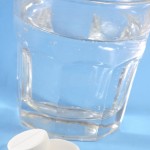100 Million Americans At Risk for Fracture From This:

 Like many people, you may get acid indigestion at times. The first thing you do is reach for your favorite over-the-counter antacid to get relief. But, what if I told you that every time you use that antacid, you increase your risk of a life-threatening fracture? It’s true. Here’s why.
Like many people, you may get acid indigestion at times. The first thing you do is reach for your favorite over-the-counter antacid to get relief. But, what if I told you that every time you use that antacid, you increase your risk of a life-threatening fracture? It’s true. Here’s why.
Your Favorite Antacid Is Damaging Your Bones
If you’re over 50, your risk for osteoporosis and a debilitating, life-changing fracture is much greater. Hormonal decreases in both older men and women can create mineral insufficiencies and weaken your bones. It can put you at higher risk for debilitating fractures of the wrist, hips, arms, ribs and spinal vertebrae.
In addition, after age 50, you’re also much more likely to get acid reflux disease. You may wonder, what does one have to do with the other? Well, a lot actually. Here’s why.
Calcium is a necessary mineral that preserves bone strength. Your natural stomach acid helps breakdown calcium from food, or supplements, so it can be properly absorbed in your gut. Yet, when you have acid reflux, and take an antacid for relief, you decrease the amount of acid your body has to process calcium.
As a result, if you take antacids several times a week, you could be significantly deficient in calcium. In addition, you could also be deficient in other vitamins and minerals that help build bones. These include magnesium, Vitamin D, vitamin K, strontium.
And you wouldn’t be alone either. Research out of the Forsyth Institute recently revealed that at least 100 million Americans take prescription and OTC antacids on a regular basis. Americans spend in excess of $14 million a year on these drugs. As such, the FDA posted warnings on all antacid packages that they may block the absorption of critical minerals.
In addition, the U.S. Healthcare system is not equipped to handle all the projected “Baby Boomer” fractures predicted to occur every year.
What You Can Do
If you take antacids chronically, your diet and/or lifestyle likely needs some adjustment. Chronic acid reflux, indigestion, heartburn indicates that something is aggravating the production of too much acid. This could be one, or several, of the following:
- Too much refined sugar in your diet. Sugar is highly acidic. When its metabolized it can increase your blood pH to acidic. As a result, chronic acid indigestion can occur.
- Too much alcohol. Alcohol is also very irritating to stomach and esophagus causing inflammation. It also causes over production of digestive acids.
- Too much acidic foods, like tomato sauces, pickles, etc.
- Heavy foods eaten later at night. Going to bed too soon after eating creates heartburn.
- Dehydration. Not drinking enough water can create heartburn as well. Water dilutes digestive juices and keeps them from irritating stomach and gut lining.
- Muscle relaxants. These can relax your LES (lower esophageal sphincter) so that it doesn’t close properly. Strong digestive acids from the small intestine can splash back through the valve and cause burning and pain.
- Smoking. Nicotine stimulates digestive juices and often causes heartburn and discomfort.
Now that you know what in your life needs changing to prevent acidic heartburn, here’s some natural acid fighting products that will help you regain your health. And the best thing is, they don’t interfere with calcium, or other minerals, absorption. In fact, they may help your body digest them better.
- Baking soda. 1 small teaspoon in a 12 ounce glass of water will help turn off an acid stomach quick.
- Liquid aloe vera. Drinking just a small amount of aloe vera once a day helps to heal the digestive tract from too much acid.
- Ginger tea, lozenges. Ginger is a long time stomach upset remedy that helps dial down stomach acid.
- Cold water. Drinking a large glass of cool water will help dilute burning stomach acid. It also helps move undigested, heavy food that’s causing too much acid to move into your small intestine.
- Deglcyrrhized licorice. Found at health food stores, its anti-inflammatory properties help dampen too much acid.
Acid reflux, and/or heartburn, can be very painful. It can keep you up at night and not functioning very well the next day. But, worse, heartburn, if left untreated, it can lead to other health conditions like infections and gastric cancers.
Yet, taking antacids more than once a week can leave your bones weak and prone to fracture. Try to make an effort to stay away from the things that create too much acid. And, if it does occur, try to treat it naturally, to prevent “bone leaching”, or pulling calcium from your bones. You’re bones will be at much lower risk for fracture and you can maintain your active lifestyle much longer.